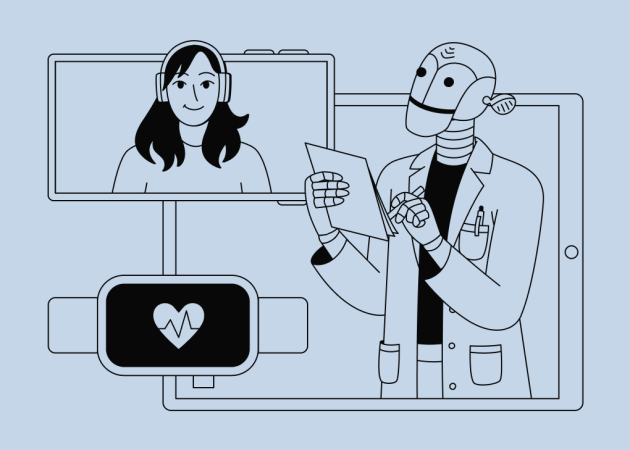
AI in Mental Health Care Solutions: Opportunities and Challenges for Tech Companies
Contents
Contents
The World Health Organization estimates that nearly one billion people live with some form of mental disorder, highlighting the urgent need for innovative solutions. Traditional methods of diagnosing and treating mental health issues often fall short in terms of accessibility and scalability. This is where mental health and AI intersect, offering new avenues to tackle these challenges through technology app Mindstrong
This article explores how AI is being utilized in mental health care, detailing the benefits it brings, and discussing the challenges that must be overcome to fully realize its potential.
A closer look at mental health struggles
Mental health challenges are a significant global concern, affecting millions of individuals across various demographics. According to the World Health Organization, depression is the leading cause of disability worldwide, with more than 264 million people suffering from this condition. Anxiety disorders, another prevalent issue, affect nearly 284 million people globally. These conditions not only diminish the quality of life for those affected but also contribute to rising suicide rates, which claim over 700,000 lives each year.
Disasters, conflicts, and economic challenges further exacerbate mental health issues. For instance, the COVID-19 pandemic has led to increased levels of stress, anxiety, and depression due to factors such as lockdowns, social isolation, and economic instability. Similarly, regions experiencing armed conflict or natural disasters often see a spike in mental health problems among their populations. These events highlight the urgent need for effective mental health interventions.
One of the most pressing issues in mental health care is the shortage of professionals. In many parts of the world, the number of trained professionals is insufficient to meet the growing demand for services. This shortage leads to accessibility issues, with many individuals unable to receive timely and adequate care. In low-income countries, the ratio of mental health workers to the population can be as low as 2 per 100,000 people, compared to 70 per 100,000 in high-income countries.
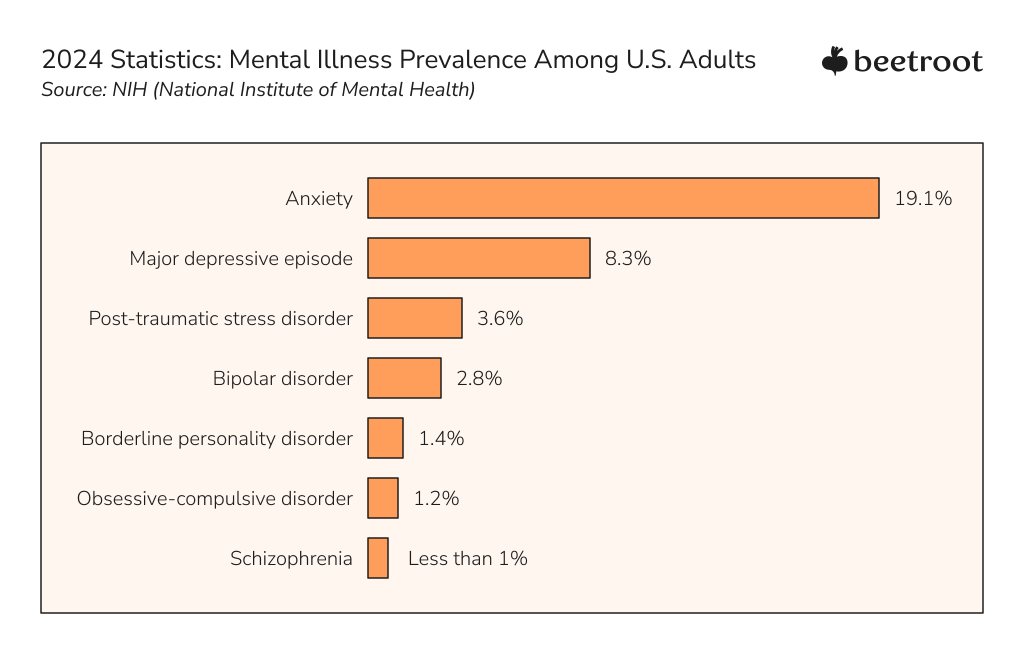
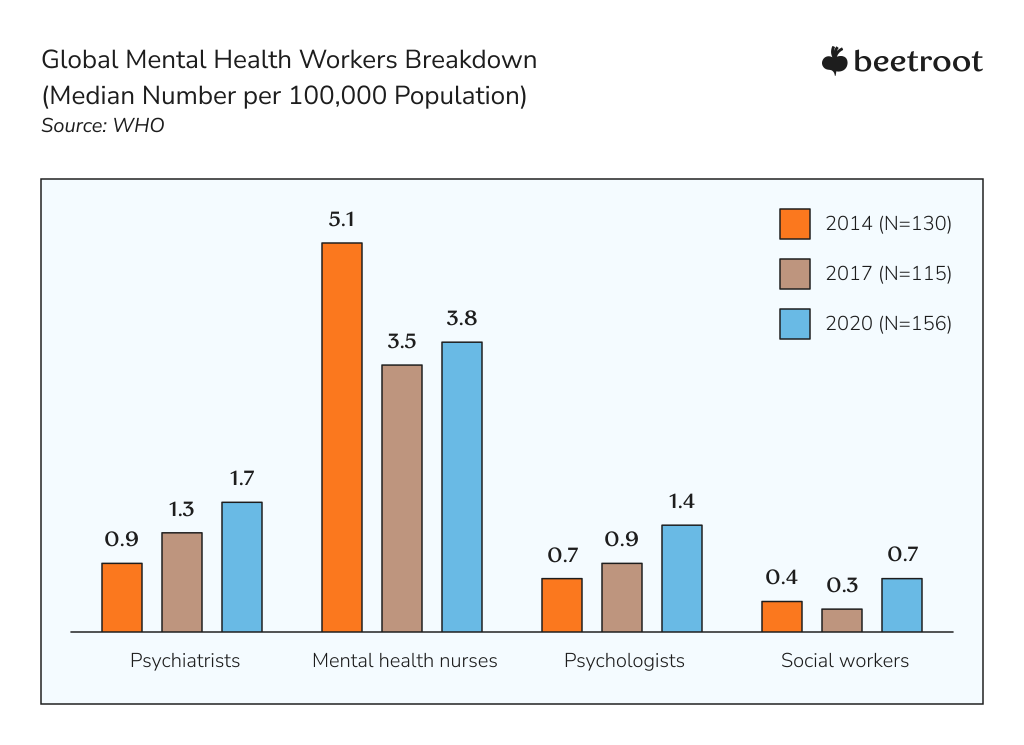
How AI is transforming mental health care
With these challenges in mind, a critical question emerges: can AI treat mental illness?Although AI cannot replace human therapists, it significantly enhances mental health care. AI in therapy means leveraging tools to support therapists and offer additional care to patients. For instance, AI-driven chatbots can conduct initial consultations, monitor patient progress, and deliver cognitive behavioral therapy techniques. These innovations help bridge the gap between the high demand for mental health services and the limited availability of professionals.
Early detection using machine learning
Machine learning algorithms analyze vast amounts of data to identify early signs of mental health issues. For example, an artificial intelligence mental health app can analyze a user’s social media activity to detect signs of depression or anxiety, allowing for early intervention before the condition worsens. These algorithms can detect patterns in social media posts, speech patterns, and digital interactions to predict mental health episodes.
Diagnostic support with natural language processing (NLP)
Natural Language Processing (NLP) plays a crucial role in AI mental health diagnosis. AI-powered systems can analyze patient conversations, written texts, and verbal communications to detect symptoms of mental health disorders. These systems support clinicians by providing additional diagnostic insights, ensuring more accurate and timely diagnosis.
AI chatbots and conversational agents
AI chatbots and conversational agents are becoming increasingly popular in mental health care. These AI-driven tools provide 24/7 support, engage in meaningful conversations with users, and offer immediate assistance. More and more people are using online tools to ask AI questions regarding their health and overall conditions. For example, Woebot and Wysa are AI chatbots that provide cognitive-behavioral therapy (CBT) techniques to users, helping them manage anxiety and depression. These tools reduce the burden on human therapists and make mental health support more accessible.

Virtual reality therapy for trauma and anxiety
Virtual Reality (VR) therapy uses immersive experiences for controlled exposure therapy. VR therapy helps individuals confront and manage their fears in a safe environment. For instance, VR programs treat PTSD in veterans by recreating traumatic events in a controlled setting, allowing patients to work through their trauma with a therapist. This innovative approach is proving to be highly effective in treating trauma and anxiety disorders.
Personalized treatment plans through data analysis
AI creates personalized treatment plans by analyzing data from various sources, including genetics, medical history, and lifestyle. These tailored interventions are designed to meet the unique needs of each patient. For example, IBM Watson Health uses AI to analyze patient data and recommend personalized treatment plans for mental health conditions, ensuring patients receive the most effective treatments based on their specific circumstances.
AI-powered mental health education
AI-driven platforms revolutionize mental health education by providing accessible information and coping strategies. These platforms use AI to deliver personalized content, interactive tools, and real-time support. For example, the app Youper provides users with personalized mental health insights and coping strategies, helping them manage their mental health more effectively. These educational tools empower individuals to take control of their mental health and make informed decisions about their well-being.
The uses of artificial intelligence in mental health are vast and rapidly growing. According to a WHO study, AI has the potential to significantly reduce the burden on mental health services by offering scalable and cost-effective solutions. The study highlighted AI’s ability to provide therapy and support to millions who currently lack access to mental health care. AI can improve diagnostic accuracy by up to 90%, cut wait times for therapy by 70%, and save up to $300 billion annually in global healthcare costs.
Integrating AI for therapy into mental health care allows us to deliver personalized, accessible, and real-time support to those in need. These advancements not only enhance patient outcomes but also tackle the global mental health crisis by making care more efficient and widely available.
AI in the mental illness treatment
Artificial intelligence is proving to be a powerful tool in treating various mental health conditions. By providing accessibility, real-time feedback, and personalized care, AI applications are making significant strides in the treatment of depression, anxiety, and schizophrenia.
Depression
Depression affects millions of people worldwide, often going untreated due to stigma, accessibility issues, or lack of awareness. AI applications are changing this by providing accessible and private support. Apps like Woebot and Wysa use AI-driven chatbots to offer cognitive-behavioral therapy (CBT) techniques, providing users with real-time feedback and coping strategies. These apps can engage users in meaningful conversations, helping them identify negative thought patterns and develop healthier habits.
Additionally, AI-powered platforms like Youper analyze user interactions and provide personalized insights to help manage depression. These tools offer privacy benefits, allowing users to seek help without the fear of stigma. By delivering support through an app, AI bridges the gap between those in need and the mental health services they require.
Anxiety
Anxiety disorders are among the most common mental health conditions, impacting millions globally. Wearable AI technology is making significant advancements in the continuous monitoring and early diagnosis of anxiety. Devices like the Apple Watch and Fitbit incorporate AI to track physiological signals such as heart rate variability and sleep patterns, providing early warnings of anxiety episodes.
Apps like Calm and Headspace, while primarily known for mindfulness and meditation, are also integrating AI features to personalize user experiences. For instance, Calm uses AI to recommend specific meditation exercises based on user preferences and stress levels, providing tailored interventions that help manage anxiety more effectively.
Schizophrenia
Schizophrenia is a complex mental health disorder that requires accurate diagnosis and consistent treatment. AI is playing a crucial role in improving care for individuals with schizophrenia. For example, the app Mindstrong uses AI to analyze data from smartphone interactions, such as typing speed and usage patterns, to detect early signs of schizophrenia relapse. This allows for timely intervention and medication adjustments.
AI is also being used to track medication adherence and support therapeutic interventions. The app Abilify MyCite combines a digital pill with an ingestible sensor that communicates with a wearable patch and a mobile app. This system tracks medication intake and provides real-time data to both patients and healthcare providers, supporting adherence to treatment plans.
By leveraging AI for therapy, healthcare providers can offer more accurate diagnoses and personalized treatment plans for individuals with schizophrenia. These advancements help manage symptoms more effectively, improving the overall quality of life for patients.
Benefits of AI in mental health care
Personalized care and tailored treatment plans
One of the significant advantages of AI in mental health is the ability to provide personalized care. Traditional mental health treatments often follow a one-size-fits-all approach, which may not be effective for everyone. AI can analyze a patient’s unique genetic makeup, medical history, and lifestyle factors to develop tailored treatment plans. Studies have shown that personalized AI-driven interventions can improve patient engagement and adherence to treatment plans by up to 60%. AI applications like Youper and Ginger use machine learning algorithms to personalize therapy sessions based on user responses, leading to more effective treatment outcomes.
Improved accessibility and global reach
AI has the potential to break down barriers to mental health care, making it more accessible to people worldwide, especially in regions with a shortage of mental health professionals. AI-powered platforms can deliver therapy and support to remote and underserved areas, ensuring that geographical location is no longer a barrier to receiving quality mental health care. The WHO reports that integrating AI into mental health services could address the treatment gap in low-income countries, where up to 90% of people with mental health disorders do not receive care.
Real-time monitoring and preventive measures
AI’s capability to monitor patients in real-time and provide preventive measures is a game-changer for mental health care. Wearable devices and smartphone apps equipped with AI can continuously track a patient’s mood, physical activity, and sleep patterns, offering real-time insights and alerts. This enables the prediction of potential mental health crises before they occur, allowing for timely interventions. AI applications like Woebot use real-time data to adjust therapy sessions and provide immediate support based on the user’s current state.

Challenges for AI in mental health care
The integration of artificial intelligence and mental health practices presents both opportunities and challenges.
Data privacy and security
Mental health data is highly sensitive, and breaches can have severe consequences. AI mental health startups must prioritize patient data confidentiality through strong encryption and secure storage solutions. A study by IBM found the average cost of a healthcare data breach is $7.13 million, highlighting the need for multiple layers of security to prevent unauthorized access.
Bias and fairness
Bias and fairness in AI algorithms are significant challenges. AI systems are only as good as the data they are trained on, and non-diverse datasets can perpetuate disparities. Training AI models on diverse datasets representing various demographics and conditions is crucial. A 2023 study showed many AI models in healthcare are predominantly trained on Western data, which may not be globally applicable. AI projects need to identify and correct biases in their systems to provide fair assessments and treatments across different populations.
Balancing human touch and automation
While AI can enhance efficiency in mental health care, balancing this with human empathy and interaction is essential. AI can handle routine tasks and initial assessments, but human therapists are crucial for emotional support. A study from the Journal of Medical Internet Research found patients prefer a combination of AI tools and human interaction. AI systems should complement, not replace, human therapists, ensuring empathy is maintained alongside efficiency.
Other limitations
Accuracy and reliability are also concerns. While AI can match human diagnostic accuracy in some cases, it can also be prone to errors. Continuous updates and validations are necessary for reliability. Additionally, integrating AI with traditional therapy requires a balanced approach. Therapists need training to use AI tools effectively, interpreting AI-generated insights and incorporating them into treatment plans.
Integrating AI into your mental health product
Successfully implementing AI in mental health technology projects involves careful planning and execution. Here are some key steps to consider:
Lay the groundwork
- Define objectives: Start by clearly defining what you aim to achieve with AI. Whether it’s improving diagnostic accuracy, enhancing patient engagement, or streamlining administrative tasks, having well-defined goals will steer your project in the right direction.
- Assess feasibility: Conduct a thorough feasibility study to check both the technical and economic viability of your project. Evaluate your existing infrastructure to identify what upgrades or changes are needed.
- Develop a robust data strategy: Quality data is the backbone of effective AI. Ensure you gather and prepare large, high-quality datasets that are diverse, accurate, and truly representative of the populations you aim to serve.
Engage a tech partner
The right tech vendor is crucial. Opt for vendors with proven experience in the health tech industry. It’s worth checking whether a tech company has access to the necessary skill sets in AI/ML & Data, and whether they can engage niche domain experts should you need them. For example, Beetroot involved a geneticist in a dedicated team for a client, which enabled them to drastically improve their AI genomics platform. Flexible tech consulting tailored to your specific needs and comprehensive support services can further indicate a strong partnership.
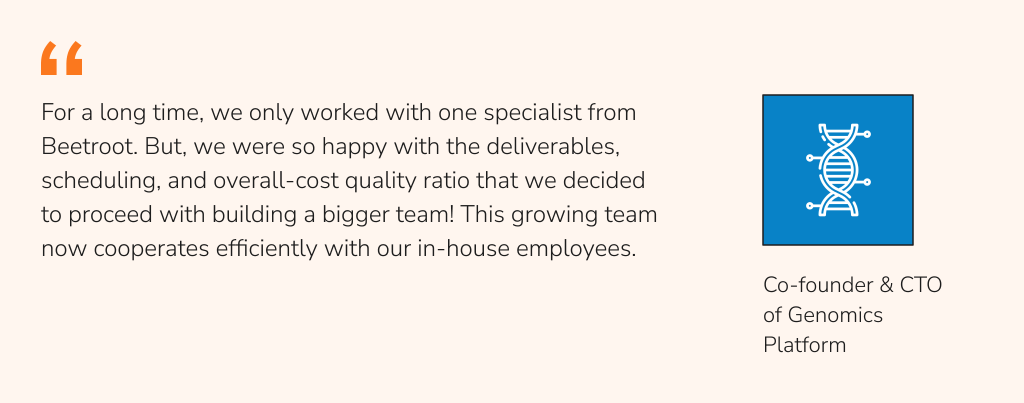
Ensure compliance
It’s vital that your AI solutions comply with ethical guidelines and legal regulations, such as GDPR and HIPAA, which dictate how patient data should be handled. Training your staff thoroughly on these aspects is crucial for the smooth integration of AI tools into your existing workflows.
Think long-term
Design your AI solutions to be scalable so they can grow with your organization and adapt to future needs. Keep abreast of the latest advancements in AI technology to continuously enhance and update your solutions.
Remember, integrating AI into your mental health product is not just about deploying new technology. It’s about transforming your operations and service delivery to better meet the needs of your clients. Embrace these changes with a strategic approach, and you’ll set the stage for significant improvements in the effectiveness and efficiency of your services.
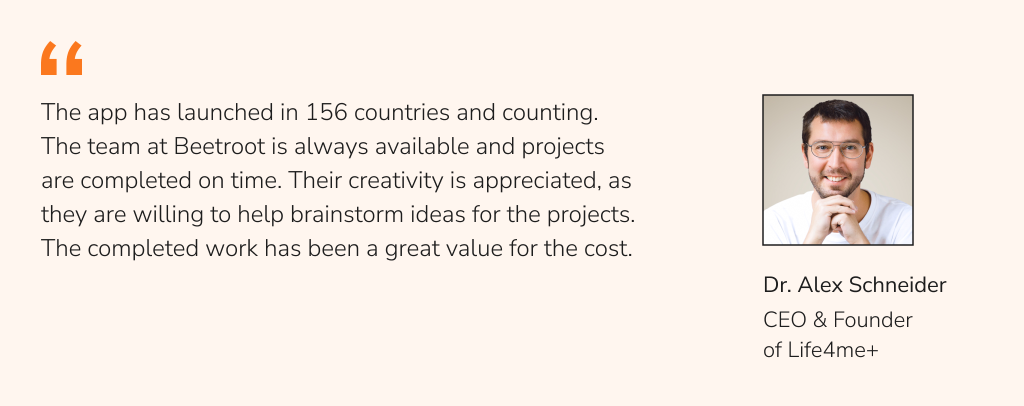
The future of AI in mental health care
As AI continues to evolve, its role in mental health care is set to expand significantly, integrating emerging technologies and innovative approaches. This evolution promises to enhance mental health care in various ways.
Emerging technologies
Virtual Reality (VR) is being increasingly used for mental health treatments, particularly in exposure therapy for anxiety and PTSD. VR environments offer controlled, immersive experiences that help patients confront and manage their fears in a safe setting. Studies have shown that VR exposure therapy can significantly reduce PTSD symptoms compared to traditional methods.
Portable devices like wearable gadgets and mobile health apps are enhancing AI’s role in mental health care by providing real-time monitoring and feedback. These devices can track physiological indicators such as heart rate and sleep patterns, offering insights into a person’s mental well-being. A study by Deloitte estimates that by 2025, the global wearable market will be worth $70 billion, with mental health applications being a significant driver of growth.
Proactive self-care and holistic approaches
AI can empower individuals to take proactive steps in managing their mental health. Apps that offer personalized self-care routines, mindfulness exercises, and stress management techniques are becoming increasingly popular. For example, apps like Calm and Headspace use AI to tailor meditation practices to individual needs.
Integrating AI with holistic health practices provides a more comprehensive approach to mental health care. This includes combining AI-driven insights with traditional therapies, nutrition, and lifestyle changes to create well-rounded treatment plans. By doing so, AI helps to address mental health more effectively, offering a balanced blend of technology and traditional care methods.
Opportunities for founders and CEOs
Health Tech leaders can develop AI-driven solutions, like therapeutic apps, AI-powered diagnostics, and virtual support systems, to transform mental health treatment. These innovations make care more accessible and personalized.
AI also significantly expands access to mental health care. Affordable AI solutions can reach underserved populations and address the global shortage of mental health professionals, ensuring more people receive the support they need. For instance, the World Health Organization estimates a global shortfall of 1.18 million mental health workers by 2030.
Leveraging AI to analyze large datasets allows health tech companies to make informed, data-driven decisions, improving product effectiveness and patient outcomes. This approach helps companies understand trends and patterns in mental health, refining their offerings to better meet patient needs. For example, Deloitte reports that AI in healthcare could save the industry $150 billion annually by 2026 through improved efficiency and resource management. The uses of artificial intelligence in mental health are vast and varied, ranging from diagnostic support to personalized treatment plans, which underscores the transformative potential of AI in this field.
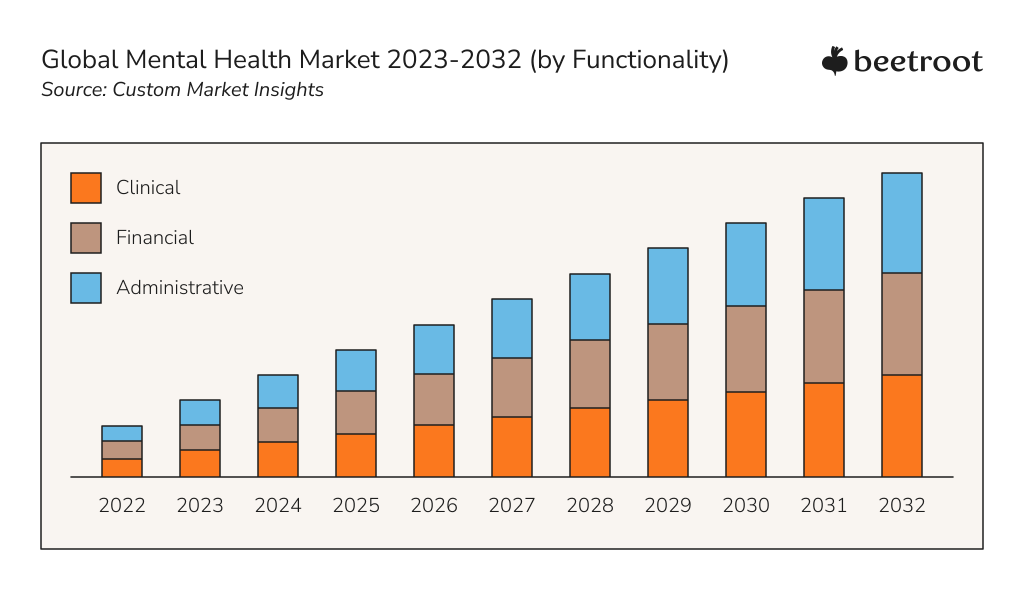
Creating AI solutions for mental health care
Despite challenges such as data privacy and validation, AI offers significant potential to transform mental health care. By helping develop customized treatment plans, providing round-the-clock support via chatbots and wearable devices, and enabling real-time monitoring and feedback, AI can improve both patient outcomes and accessibility. With thoughtful implementation and diligent oversight, these technologies can lead to more effective, personalized, and accessible mental health care solutions.
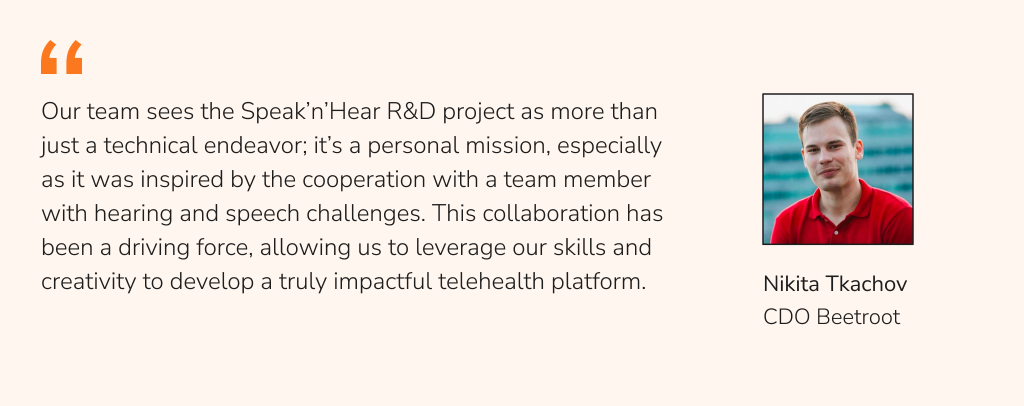
Choosing the right tech partner is crucial for successfully implementing AI in mental health products. Partnering with an experienced vendor can provide the expertise and support needed to navigate the complexities of AI integration.
At Beetroot, we have extensive experience in the HealthTech industry, building reliable tech teams. We have access to advanced machine learning technology and examination data. Additionally, we can bring in niche domain experts to tackle the most challenging issues. Our expertise can help you leverage AI to improve patient outcomes and expand access to care.
Contact us today to learn more about our services and how we can support your journey in integrating AI into mental health care.
Subscribe to blog updates
Get the best new articles in your inbox. Get the lastest content first.
Recent articles from our magazine
Contact Us
Find out how we can help extend your tech team for sustainable growth.


